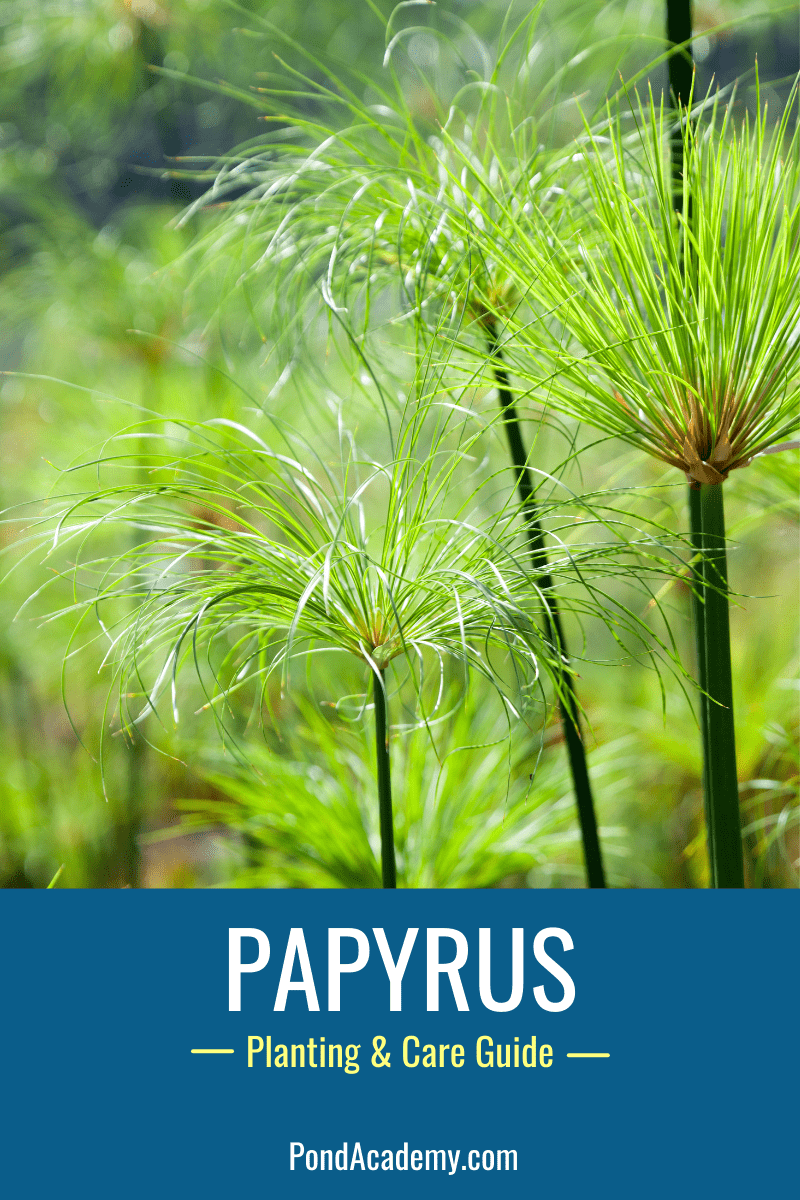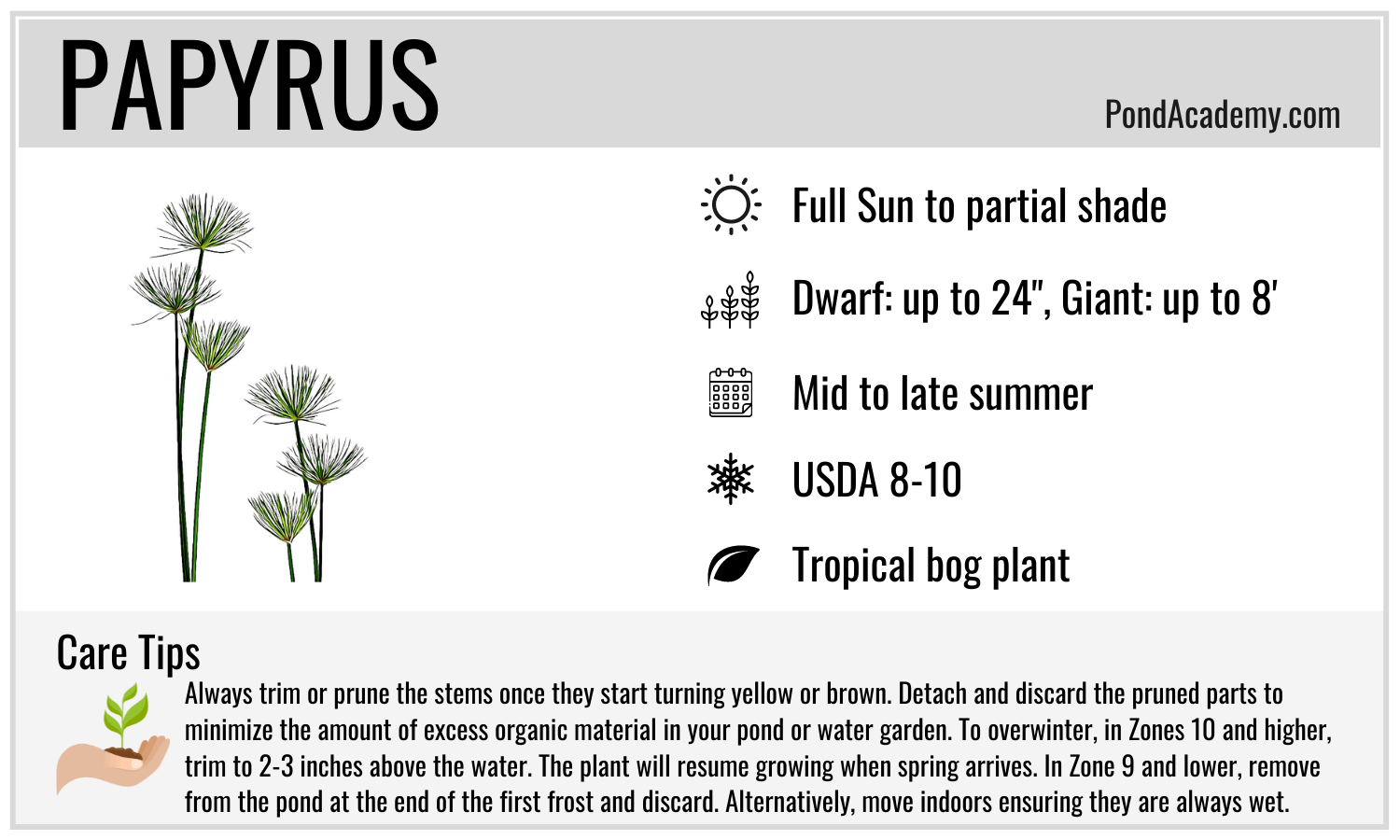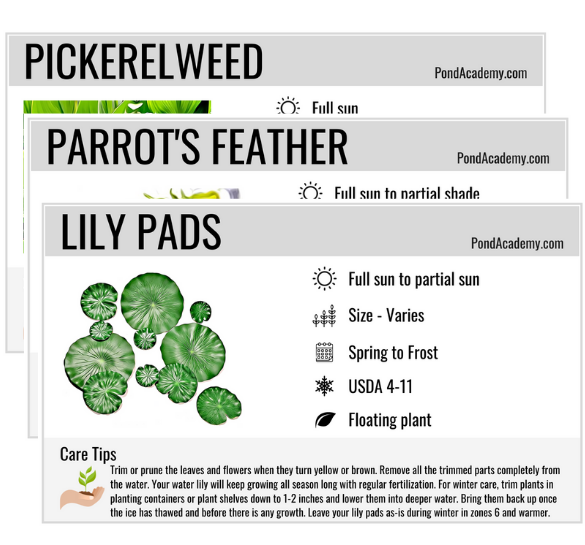Papyrus Pond Plant - Care & Grow Guide
Pond Academy is reader-supported. Buying through links on our site may earn us an affiliate commission. As an Amazon Associate I earn from qualifying purchases.

Papyrus belongs to the genus Cyperus and is often called the bulrush or Umbrella plant.
Although the genus is native to Madagascar, Papyrus plants have an important history in ancient and civilized Egypt. Papyrus has been used as paper, fragrance, food, and woven goods over the years.
Papyrus can grow up to 24 inches in height (and up to 8 ft for Giant Papyrus), retaining its thin, dark green stalks and light green tufts of foliage. This tropical bog plant is classified as a sedge and thrives in warm and moist environments. Papyrus grows as a half-hardy perennial or an annual in most zones.
You can plant Papyrus in USDA plant hardiness zones 8 to 10, provided you find an area with full sun and shallow water.
So, if you're looking for a suitable aquatic plant addition to your naturalized bog area or pond, the Papyrus should be on your list.
Common Names
Umbrella plant, bulrush, cyperus papyrus, papyrus sedge, paper reed, Indian matting plant or Nile grass
Plant Type
Tropical bog plant
Light Requirements
Full Sun to partial shade
Hardiness Zones
USDA 8-10
Bloom
Mid to late summer
Grow Up To
24 inches in height for Dwarf Papyrus and up to 8 ft. for Giant Papyrus
Flower Color
Greenish brown
How To Plant Papyrus In A Pond
The most common types of Papyrus planted in backyard ponds are Giant Papyrus and Dwarf papyrus (and there is even a Dwarf Giant Papyrus.)
Dwarf Papyrus & Dwarf Giant Papyrus
The dwarf papyrus is best planted in 8-inch (or larger) containers containing moist loamy soil. You can also plant it in the ground with similar soil conditions. Either way, ensure the plant receives full sun to partial shade. The containers should be placed on the ledge or shelf of your pond, with the pond water covering the pot by 2 to 4 inches.
Giant Papyrus
You can plant the giant papyrus both in and out of the pond. When planting, ensure the plant’s crown is above the water - you may submerge the roots.
Preferably, plant Giant papyrus in at least a 12” by 12” container. Be sure to pack the bottom of the container with rocks (or a weight) to keep strong winds from blowing your plant over. Use heavy loam soil for planting.
You will need to fertilize your giant papyrus once a month for the best results. Full sun to partial shade will help Giant papyrus grow up to heights of 6 – 8 feet! The giant papyrus is hardy in zones 8-12.
Get Our Best Pond Tips Sent to Your Inbox for Free!
Join thousands of others and learn from our decades of pond building and maintenance experience! Your pond will thank you!
By subscribing you agree to receive emails from PondAcademy.com. We will always respect your privacy and you can unsubscribe at any time.
Papyrus Care Guide
Always trim or prune the stems once they start turning yellow or brown. Detach and discard the pruned parts to minimize the amount of excess organic material in your pond or water garden.
Winter Care
The arrival of winter means the stem will start dying off. If you are in Zones 10 and higher, trim to 2-3 inches above the water. The plant will resume growing automatically when spring arrives. If you are in Zone 9 and lower, treat your Papyrus plant as an annual. Carefully remove them from the pond at the end of the first frost and discard them. Alternatively, you can keep them indoors ensuring they are always wet.
Papyrus Care Card
Download our free printable care card for the Papyrus plant! Click the care card below and save the PDF file to your computer. You can easily print off the 3x5 care card or access it right from your phone. Get all the important information you need to keep your Papyrus plants healthy and happy!
Plus, we provide a blank card for you to print and fill out yourself. Print it as many times as you like to create cards for all your plants!

Pond Plant Care Card Set







